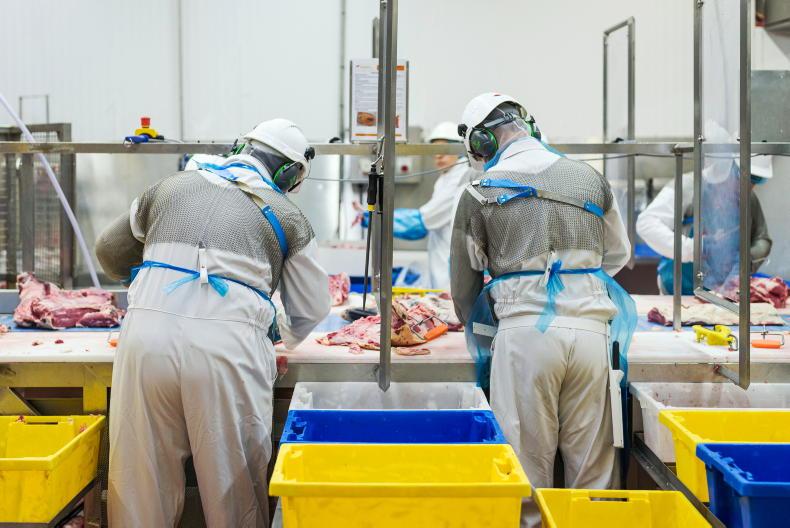New rules announced by the UK Government this week to raise the salary threshold for overseas workers from £26,200 (€30,465) to £38,700 (€45,000), will impact the meat-processing sector and wider food industry in the UK. The Migration Advisory committee (MAC) list of shortage occupations where employees could be paid 80% of the old £26,200 (€30,465) minimum threshold is being abolished. The industry had lobbied unsuccessfully for meat factory butchers to be included on this list.
Nick Allen, chief executive of the British Meat Processors Association (BMPA) told the Irish Farmers Journal that although the minimum wage for overseas workers was £26,200 (€30,465), many meat industry workers earned higher than that because of the bonus structured payments in the sector, the latest announcement would in time increase wage costs.
He explained that at present the industry is well staffed to handle the reduced cattle supply, but that overseas staff rotate as people return to their home countries and are replaced by others. Over time this will impact on the industry and it will not just increase wage costs for overseas skilled labour, it will also pull up overall factory wage costs.
However, at present the main concern for meat factory operators in Britain, according to Nick Allen, is not the supply of skilled labour, but a shortage of veterinarians without whom an abattoir cannot operate.
Norman Bagley, head of policy at AIMS, the Association of Independent Meat Suppliers, is less concerned because slaughtermen and skilled boners are already earning more than the threshold. There is more concern in Northern Ireland, where the beef and sheep meat processors have a large number of overseas employees. Daryl McLaughlin,chief executive of the Northern Ireland Meat Exporters Association, told the Irish Farmers Journal that they were meeting Home Office officials this week to explore options.
The new threshold for overseas workers was announced by the government in response to record immigration figures of 745,000 people in 2022 and the new measures will mean that annually 300,000 less people will qualify to enter the UK.
While meat processing and the wider food industry are heavily reliant on overseas workers, the greatest dependence is in the health sector, where 101,000 visas were issued to overseas care workers in the year to September 2023 and a further 120,000 visas were granted to their family dependents.
From spring 2024, the minimum income threshold for family visas will increase to £38,700 (€45,000) from £18,600 (€21,628) at present.
New rules announced by the UK Government this week to raise the salary threshold for overseas workers from £26,200 (€30,465) to £38,700 (€45,000), will impact the meat-processing sector and wider food industry in the UK. The Migration Advisory committee (MAC) list of shortage occupations where employees could be paid 80% of the old £26,200 (€30,465) minimum threshold is being abolished. The industry had lobbied unsuccessfully for meat factory butchers to be included on this list.
Nick Allen, chief executive of the British Meat Processors Association (BMPA) told the Irish Farmers Journal that although the minimum wage for overseas workers was £26,200 (€30,465), many meat industry workers earned higher than that because of the bonus structured payments in the sector, the latest announcement would in time increase wage costs.
He explained that at present the industry is well staffed to handle the reduced cattle supply, but that overseas staff rotate as people return to their home countries and are replaced by others. Over time this will impact on the industry and it will not just increase wage costs for overseas skilled labour, it will also pull up overall factory wage costs.
However, at present the main concern for meat factory operators in Britain, according to Nick Allen, is not the supply of skilled labour, but a shortage of veterinarians without whom an abattoir cannot operate.
Norman Bagley, head of policy at AIMS, the Association of Independent Meat Suppliers, is less concerned because slaughtermen and skilled boners are already earning more than the threshold. There is more concern in Northern Ireland, where the beef and sheep meat processors have a large number of overseas employees. Daryl McLaughlin,chief executive of the Northern Ireland Meat Exporters Association, told the Irish Farmers Journal that they were meeting Home Office officials this week to explore options.
The new threshold for overseas workers was announced by the government in response to record immigration figures of 745,000 people in 2022 and the new measures will mean that annually 300,000 less people will qualify to enter the UK.
While meat processing and the wider food industry are heavily reliant on overseas workers, the greatest dependence is in the health sector, where 101,000 visas were issued to overseas care workers in the year to September 2023 and a further 120,000 visas were granted to their family dependents.
From spring 2024, the minimum income threshold for family visas will increase to £38,700 (€45,000) from £18,600 (€21,628) at present.






 This is a subscriber-only article
This is a subscriber-only article










SHARING OPTIONS: